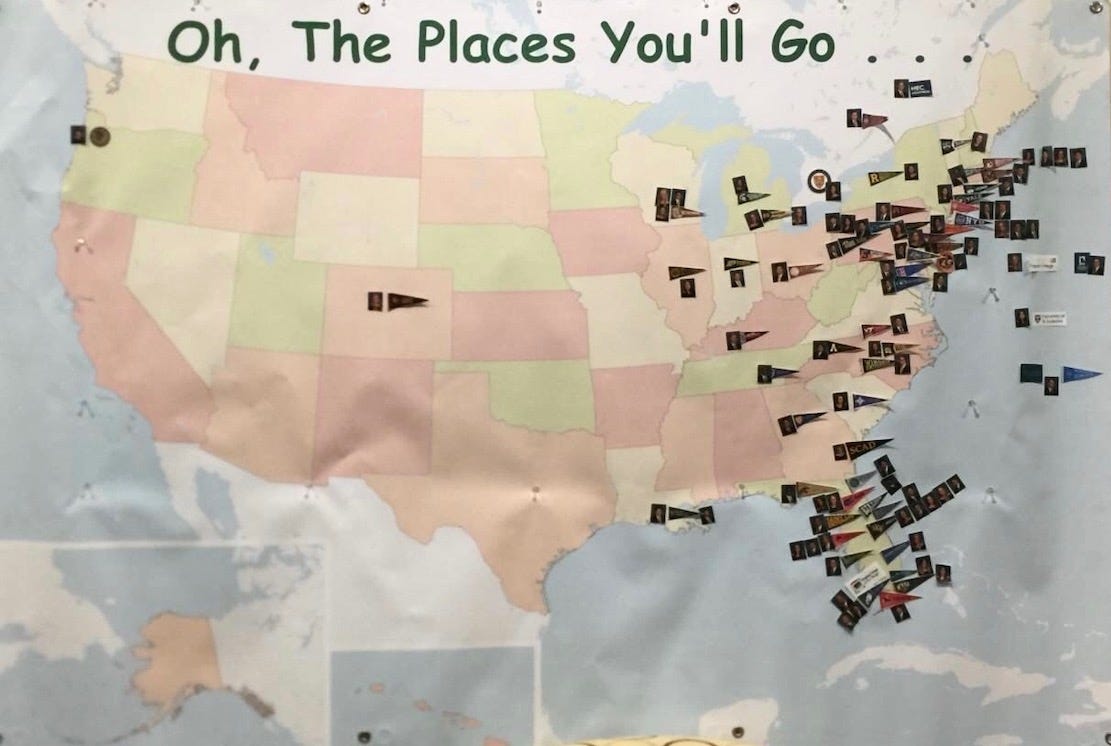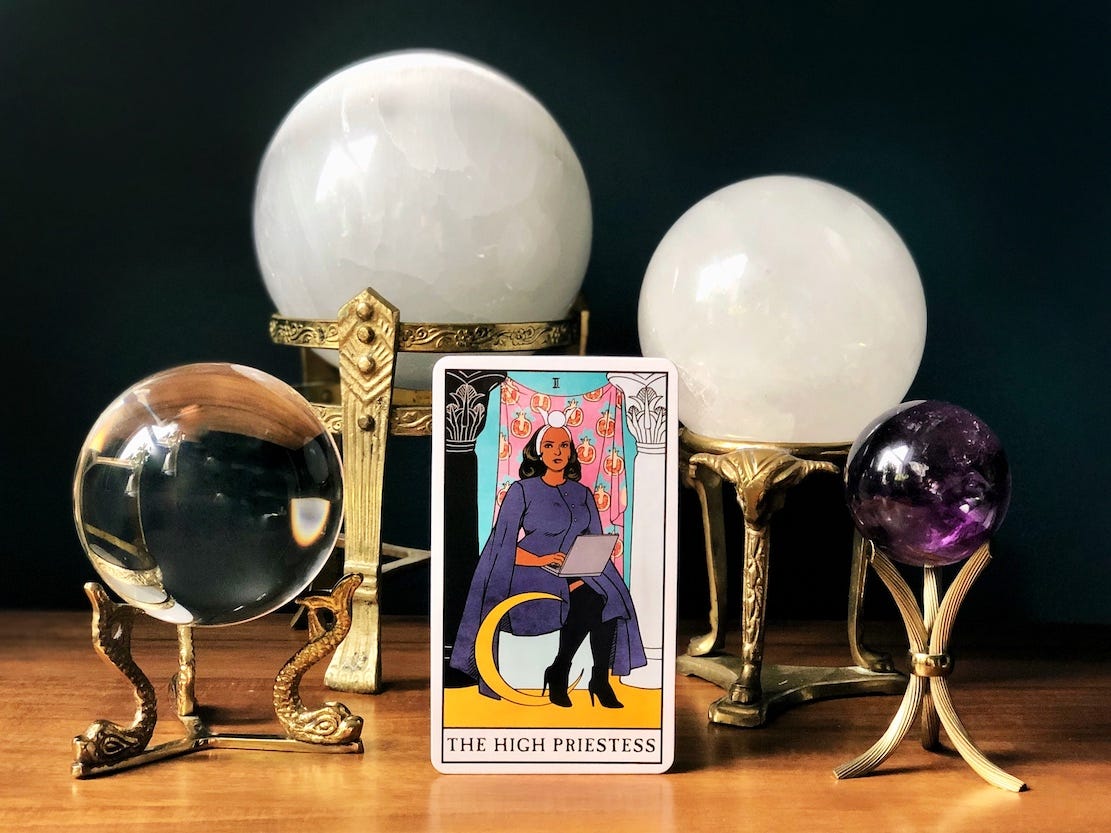I was seventeen the first time it happened.
For months beforehand, I lived inside a fantasy, pouring all my hopes and dreams into what seemed meant to be. Then one day, I arrived home to discover a most unwelcome surprise — a small, thin, envelope bearing the logo of my first-choice college. They regretted to inform me that I’d been rejected.
I can promise I regretted it more.
Technically, that wasn’t my earliest brush with rejection (there were plenty of unrequited crushes to thank for that) but it was the first time I allowed an external judgment to crush me. To make matters worse, it felt like everyone knew.
Every fall, our school hung a huge map on the wall near the front office. Whenever a member of the senior class was admitted to a college, a little construction paper flag bearing their name and future school, appeared. Anyone who entered the building couldn’t help but see it — as well as gather round, point, and gossip.
As the weeks rolled by, the map filled with my classmates’ pennants, dozens of tiny flags bursting forth like a field of menacing triangular wildflowers. Whenever I walked by, I’d avert my eyes and hold my breath, hoping my own good news might be just around the corner. As we neared the end of the school year, I was the last member of the graduating class without a single flag.
Twenty years later, I’m still haunted by that map. I’m sure it was meant to be encouraging, a celebratory moment for those with something to cheer. But that doesn’t erase the part where it was also insensitive — added pressure during an already stressful period. I wish I could go back and tell baby me that it wasn’t personal. But like so many lessons, that would take time.

Some people have a healthy relationship with rejection. They acknowledge that they took a chance, something worth commending. They use it as an opportunity for growth. They solidify their resolve, march back out there, and try again.
At least, that’s what I’ve heard. Because I am not one of them.
Rejection is a part of life, along with its cousins failure, disappointment, and criticism. A 2021 study reported that the average job seeker is turned down by 24 jobs before hearing a yes. A typical day on the dating app Tinder sees over 1 billion profile swipes and 12 million matches — that means hundreds of millions of rejections that no one ever sees.
We are told that every mega-success is often preceded by years of invisible rejections. Oprah was fired from her first TV job, as co-anchor of Baltimore’s 6 o’clock news. The Beatles’ early career was marked by a series of failures, including being dismissed by the leading record company at the time. Stephen King received 30 rejections for his debut novel, Carrie, before it found a home (and a $2,500 advance) at Doubleday.
You cannot please everyone — not at home, not at work, not in life. But that doesn’t stop us from trying.
When it comes to sharing creative work, it’s especially impossible to find universal appeal. As a writer friend always tells me, the only way to guarantee a neutral reaction is by putting out work that is so safe as to be boring. And no one benefits from that.
Of course, the very same friend who dispenses this wisdom is understandably irritated when someone gives her books a less than stellar review. We lob the same advice back and forth, repurposed reminders about subjectivity and not taking things personally.
“Can you imagine if people were given the option to review the art in museums?” I joked.
“One star. Perhaps I’m missing something, but it was a blob.”
“Impressive, but red is not my color. Three stars.”
“Two stars. I mean, I feel like I could have made this myself?”
It’s so easy to see objectively when criticism is aimed at others. How I would hate for my friend’s massive accomplishment to be tarnished by the opinion of a complete stranger! But how do we adopt this clarity within our own situations? How do we let the words roll off us and keep on going?
I once worked at a company where an executive loved to employ the phrase “Rejection is protection!” Over and over, this maxim floated down the hall, a reminder that when things don’t work out, it’s often for the better.
Didn’t land a big client? “Rejection is protection!” Someone else got the gig? “Rejection is protection!” Sometimes, the protection is implicit. Other times, it’s harder to see.
A number of years ago, I shared one soul-crushingly bad date with a lawyer who, after mansplaining the highlights of my own neighborhood to me, opined on how to write a novel, an area in which he had lots of practical experience. (Sarcasm.) “I’ll tell you how to write a good book,” he said. “It’s just about sentences. Words and sentences. It doesn’t matter what happens in the story. No one cares about that.”
The night ended early and without fanfare. I returned home, grateful to never see or hear from this person again.
The following evening, I was out walking my dog when a message popped up.
“Heya Caroline! You seem like a super cool lady, but unfortunately, you’re not for me. Sorry to say I didn’t feel a romantic spark. Best of luck out there!”
Sometimes, rejection is without a doubt protection, but it is also superfluous.
Whenever I find myself grappling with hard feelings over some external judgment, I always think back to Brené Brown’s Netflix special, The Call to Courage. At one point, she talks about seeing the initial response to her viral TEDx Houston talk on vulnerability. As soon as the video was posted on YouTube, the view count exploded. Unfortunately, so did the comments.
“You can study shame, yet you are never prepared,” she says, before recounting some of the more vicious messages. “There was everything I had feared my whole life.” At first, she retreated to her couch, with Netflix and a generous helping of peanut butter. But later that day, she stumbled across Theodore Roosevelt’s famous quote about daring greatly, which changed the course of her life:
“It is not the critic who counts: not the man who points out how the strong man stumbles or where the doer of deeds could have done better. The credit belongs to the man who is actually in the arena, whose face is marred by dust and sweat and blood, who strives valiantly, who errs and comes up short again and again, because there is no effort without error or shortcoming, but who knows the great enthusiasms, the great devotions, who spends himself in a worthy cause; who, at the best, knows, in the end, the triumph of high achievement, and who, at the worst, if he fails, at least he fails while daring greatly, so that his place shall never be with those cold and timid souls who knew neither victory nor defeat.”
Choosing courage over comfort is not the easy path. But if you wish to live in alignment with the stuff that moves you, it is often the only way. Perhaps, when viewed through this lens, we can come to see our failures, criticisms, and rejections as positives — experiences we have in common with the likes of Oprah and The Beatles and Brené.
It can be hard to trust that things will work out when they’re still in the process of working. But safely in the distance, I often think about how grateful I am for the roads I couldn’t take. Thank goodness for the schools and jobs and dates that led nowhere, but helped me stumble, eventually, upon the right ones.
Sylvia Plath — whose novel The Bell Jar was rejected by American publishers and originally released under a pseudonym — once said, “I love my rejection slips. They show me I try.” I’m still learning to see the good in rejection letters. I may never love bad reviews. But I am accepting, slowly, that not only is it impossible to know what runs through the minds of those who pan us, it’s also none of our business.
Whatever you attempt — and whatever the outcome — may the pursuit be its own badge of courage. And may the unfolding path be its own reward.
Card of the Week
Here is this week’s card for the collective, as well as some thoughts to carry into the days ahead. As most modern readers will tell you, the tarot is not about fortunetelling, nor is it about neat, definitive answers. The cards are simply one path to reflection, a way of better knowing ourselves and others through universal themes. If this reading resonates with you, great! And if not, no worries. Take whatever may be helpful and leave the rest.

Last year, I took a virtual class with legendary tarot expert Rachel Pollack. She shared many treasures, including her practice of intentional dressing — choosing symbolic colors and accessories to pay homage to the gods and goddesses who correspond with each day of the week.
“It’s Wednesday, so I’m wearing my Hermes pin,” she explained, holding a small golden disc up to the camera. (That’s Hermes, the Olympian god of trade and athletes, not to be confused with the luxury brand Hermès.)
Over the course of our time together, Rachel spoke about why such practices give us meaning, how common stories have the power to link people across space and time. “Why do we have myths?” she asked the screen full of floating faces. Despite popular belief, she explained, it’s not for certainty, nor clarity. It’s not to explain our nature, or even to help us grasp the more unknowable parts of the human experience. Myths do not provide answers so much as they ask questions — prompting us to find and create meaning for ourselves.
The High Priestess loves to pose such questions. She dwells in the space between mystery and intuition, conscious and unconscious. Where others are in motion — trying, spinning, speaking — she is content to remain still. Her superpower is observation. She is always aware of the space she inhabits, tapped into both the external plane and the world within.
At a party, The High Priestess would undoubtedly find a perch in the corner where she could watch all the action unfold. She’d take note of everyone’s mannerisms, expressions, character. She’d know who has a crush on who, who can’t wait to leave, who never wanted to show up in the first place. At the end of the evening, she’d have more insight on each person’s experience than the people who actually lived it.
In our everyday lives, we worship movement. We spend ours days rushing about, trying to do and make and fix. We like to see tangible, measurable results. We ask for clear instructions and specific feedback, so we can continue to improve.
Ever the nonconformist, The High Priestess understands that not every situation requires action. That progress is not synonymous with productivity, and achievement is not the measure of worth.
As people, it’s within our nature to want to solve things. There’s a high likelihood you’ve been part of a conversation where one person presents a problem or conundrum and the other person immediately jumps in with a solution. “I wasn’t asking you to fix it!” the sharer sighs. “I just wanted you to listen!”
It’s not always comfortable to dwell within uncertainty. We writhe and ruminate and grasp for answers. We keep at the crossword until it’s done, refresh our email until the response appears, badger our partner until we understand exactly what they meant.
But if you can learn to coexist with ambiguity — to be okay with the unknown, to sit with what is — it will only benefit you.
The High Priestess is often depicted as consulting her book (or in this case, her laptop) of secrets. Because of her observant nature, she hears what is unsaid. She often knows what will happen before it comes to pass.
This card reminds us that intuition is not a superpower so much as a trait to be cultivated, a sense often lying dormant within us. Far from supernatural, it’s simply the act of sharpening your ability to observe and feel, in tandem, until you become aware of the knowledge already within you.
Western culture celebrates the mind. It loves answers. Plans. Directions. But this card teaches us that there are many types of knowing.
Einstein said, “The mind can proceed only so far upon what it knows it can prove. There comes a point where the mind takes a leap — call it intuition or what you will — and comes out on a higher plane of knowledge, but can never prove how it got there. All discoveries have involved such a leap.”
The High Priestess urges us to stop, look, and listen. Don’t rush to take action. Don’t clamor to fix things. Don’t make haste. Do not make a move.
In the days ahead, try a different approach. If you find yourself looking for an answer, why don’t you pose a question instead?
The High Priestess asks: What solution are you seeking? Why does it matter? What’s really at the heart of this? What might you already sense about the outcome, and how will you proceed once it is known?
Perhaps you will uncover the truth: mystery and knowledge aren’t so far apart.











I've been reading your newsletter for a few months now and look forward to it every week! But like several of the others who commented, this post *really* spoke to me. I'm a people-pleaser and a perfectionist, and can relate to so much of what you covered here. I love this concept of "rejection is protection" and am posting it on the inside of my brain, as well as sticky notes around my desk. I want to embrace the awkward, imperfect trying. That's what life is all about, isn't it? Learning and growing and becoming. Thank you for putting yourself out there, too, with this newsletter series. Your readers appreciate you!
Thank you for sharing! Definitely resonated with me. For me, the fear of rejection is often what keeps me from doing anything at all. This was a helpful reframe. :)